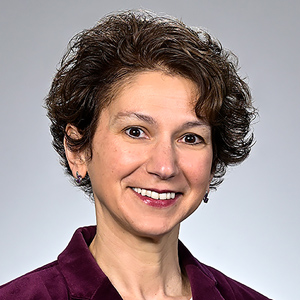
In order to advance the science of medicine, academics must first envision where it’s heading. Jennifer Myers has demonstrated a savvy ability to do exactly that. Unlike some of her peers, Myers knew from the earliest days of medical school that she wanted to stay in the halls of academia. At MCP-Hahnemann, she was part of a club of students interested in academic internal medicine — during meetings they would share and discuss medical journal articles with faculty members.
“I remember when I was interviewing for residency in my fourth year of medical school. I didn’t know exactly what type of internal medicine doctor I wanted to be, but I knew I wanted to be in academic medicine,” she says. “I valued the teaching and learning environment and being part of new science and discovery.”
She ended up matching at the Johns Hopkins Hospital and completed her internship and residency there. She toyed with the idea of choosing a subspecialty but ultimately found the idea of being a generalist in a hospital setting more appealing. It was good timing, as hospitalists were starting to become more common. Her first job was as a hospitalist at the University of Pennsylvania, and she remains there today as professor of clinical medicine at the Perelman School of Medicine at the University of Pennsylvania.
Working in a relatively new field afforded Myers opportunities to contribute to a rapidly growing body of knowledge, and she sought out chances to write, teach and publish. Over time she developed expertise in another new and growing area — health care quality improvement and patient safety.
“Early on, I found myself volunteering for one of the first quality committees in the Department of Medicine at Penn,” she says. “I loved the interprofessional topics and discussions, so I volunteered to lead different projects. And that ultimately ended up with me being asked to serve in a more formal hospital-based role at Penn as one of their first patient safety officers. And so, for the next decade, I learned all about adverse event investigation and analysis, and the science of patient safety.”
Myers realized that the natural progression of this work was to teach what she had learned and translate that to others. She worked to bridge health care quality and safety and medical education. With a career development award in medical education from the Josiah Macy Jr. Foundation, she started to research, plan and build infrastructure at Penn to support her ideas. She currently directs Penn’s Center for Healthcare Improvement and Patient Safety (CHIPS), which provides a framework for students, residents, faculty, nurses and other interprofessional health care staff to learn how to make improvements in the health care delivery system.
The joy of Myers’ work is that she has discovered she loves to mentor and coach people and ideate new programs. Her efforts in quality and safety have allowed her to work with physicians and health care workers across specialties.
“One of the hats that I wear within our Division of Hospital Medicine is director of faculty development. That combines two of my passions and interests — developing other people’s careers and creating infrastructure for the new faculty in our division. That work has been one of my proudest achievements.” Myers loves nothing more than when her mentees — whether they are students, residents or junior faculty — eclipse her with their own achievements. She continues to see patients about 12 weeks out of the year.
And even with all of her responsibilities, her career has given her the flexibility to have three children and be present for them. (This year Myers and her husband, Ian, who met on the first day of medical school, are celebrating their 25th anniversary.) In choosing academic medicine, Myers instinctively chose the ideal career direction for her own professional and personal fulfillment. “I love to teach, I love to write, I love to develop people and programs, and I love medicine. And this work allows me to do all of those things in one job. I couldn’t have made a better path for myself.”